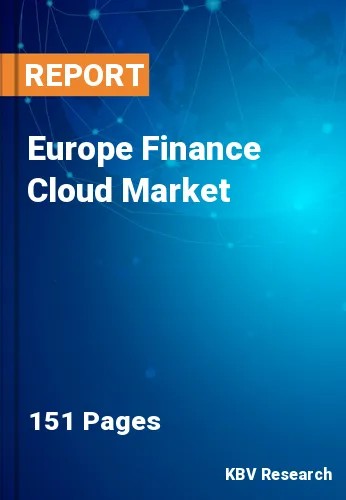The Europe Finance Cloud Market would witness market growth of 19.8% CAGR during the forecast period (2022-2028).
People are slowed down by insufficient information, repetitive activities, and restricted accessibility while using manual systems like spreadsheets, emails, and unconnected applications. People repeatedly manually enter the same data, which increases the likelihood of a human mistake. It's crucial to connect all of these systems and make information available from everywhere if they want things to work well.
Cloud financial management software is the way to go if businesses want to increase productivity and cut out errors. Although using online systems has become commonplace, most medium-sized and large-scale organizations are apprehensive to migrate to cloud financial management software. When a business decides to transition to the best cloud financial management software, the debate around security and privacy issues in the cloud frequently flares up.
Given the sensitive nature of the data (payroll, tax, and revenue) housed in these systems, some of these worries are legitimate. Only 5% of the time are the providers at blame, according to a recent Gartner analysis. This demonstrates the importance that cloud service providers have on privacy and security. Although have total control over data with an on-premise system, it isn't quite as flexible as an online system.
Germany's more than 36,000 bank branches can accept customer deposits and loans as well as transact in securities due to the nation's universal banking system. There are no reports of a credit crunch in the German economy. Credit is provided to both domestic and international investors at rates set by the market, and there are many different credit instruments. In the past, German banks were able to have a substantial impact on the industry due to the country's long-standing system of cross-shareholding between banks and industry and a high proportion of bank borrowing compared to equity financing.
The Germany market dominated the Europe Finance Cloud Market by Country in 2021, and would continue to be a dominant market till 2028; thereby, achieving a market value of $4,386.2 million by 2028. The UK market is anticipated to grow at a CAGR of 18.7% during (2022 - 2028). Additionally, The France market would exhibit a CAGR of 20.7% during (2022 - 2028).
Based on Offering, the market is segmented into Solution (Security, Financial Reporting & Analysis, Financial Forecasting, Governance, Risk & Compliances, and Others.) and Services. Based on Deployment, the market is segmented into Public, Private, and Hybrid. Based on End-use, the market is segmented into Banking & Financial Services and Insurance. Based on Organization Size, the market is segmented into Large Enterprises and Small & Medium Enterprises (SMEs). Based on Application, the market is segmented into Wealth Management, Account Management, Revenue Management, Customer Relationship Management, Asset Management, and Others. Based on countries, the market is segmented into Germany, UK, France, Russia, Spain, Italy, and Rest of Europe.
Free Valuable Insights: The Global Finance Cloud Market will Hit $68.8 Billion by 2028, at a CAGR of 20.5%
The market research report covers the analysis of key stake holders of the market. Key companies profiled in the report include IBM Corporation, Google LLC, Microsoft Corporation, Oracle Corporation, SAP SE, Amazon Web Services, Inc., Cisco Systems, Inc., The Sage Group PLC, Acumatica, Inc., and Aryaka Networks, Inc.
By Offering
By Deployment
By End-use
By Organization Size
By Application
By Country
Our team of dedicated experts can provide you with attractive expansion opportunities for your business.

